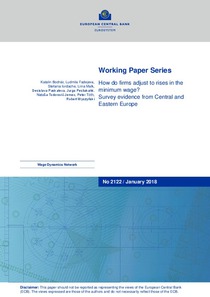How do firms adjust to rises in the minimum wage? Survey evidence from Central and Eastern Europe
"We study the transmission channels for rises in the minimum wage using a unique firm-level dataset from eight Central and Eastern European countries. Representative samples of firms in each country were asked to evaluate the relevance of a wide range of adjustment channels following specific i...
| Main Authors: | , , , , , , , , |
|---|---|
| Institution: | ETUI-European Trade Union Institute |
| Format: | TEXT |
| Language: | English |
| Published: |
Frankfurt am Main
2018
ECB |
| Subjects: | |
| Online Access: | https://www.labourline.org/KENTIKA-19396463124911146459-How-do-firms-adjust-to-rises-i.htm |
| _version_ | 1771659897459441665 |
|---|---|
| author | Bodnar, Katalin Fadejeva, Ludmila Iordache, Stefania Malk, Liina Paskaleva, Desislava Pesliakaite, Jurga Jemec, Natasa Todorovic Tóth, Peter Wyszynski, Robert |
| author_facet | Bodnar, Katalin Fadejeva, Ludmila Iordache, Stefania Malk, Liina Paskaleva, Desislava Pesliakaite, Jurga Jemec, Natasa Todorovic Tóth, Peter Wyszynski, Robert |
| collection | Library items |
| description | "We study the transmission channels for rises in the minimum wage using a unique firm-level dataset from eight Central and Eastern European countries. Representative samples of firms in each country were asked to evaluate the relevance of a wide range of adjustment channels following specific instances of rises in the minimum wage during the recent post-crisis period. The paper adds to the rest of literature by presenting the reactions of firms as a combination of strategies, and evaluates the relative importance of those strategies. Our findings suggest that the most popular adjustment channels are cuts in non-labour costs, rises in product prices, and improvements in productivity. Cuts in employment are less popular and occur mostly through reduced hiring rather than direct layoffs. Our study also provides evidence of potential spillover effects that rises in the minimum wage can have on firms without minimum wage workers." |
| format | TEXT |
| geographic | Central Europe Eastern Europe |
| id | 19396463124911146459_7d97a6cae2004eaeb7a3b0f6404cf4d3 |
| institution | ETUI-European Trade Union Institute |
| is_hierarchy_id | 19396463124911146459_7d97a6cae2004eaeb7a3b0f6404cf4d3 |
| is_hierarchy_title | How do firms adjust to rises in the minimum wage? Survey evidence from Central and Eastern Europe |
| language | English |
| physical | 50 p. Digital |
| publishDate | 2018 |
| publisher | Frankfurt am Main ECB |
| spellingShingle | Bodnar, Katalin Fadejeva, Ludmila Iordache, Stefania Malk, Liina Paskaleva, Desislava Pesliakaite, Jurga Jemec, Natasa Todorovic Tóth, Peter Wyszynski, Robert minimum wage productivity literature survey How do firms adjust to rises in the minimum wage? Survey evidence from Central and Eastern Europe |
| thumbnail | https://www.labourline.org/Image_prev.jpg?Archive=131547995972 |
| title | How do firms adjust to rises in the minimum wage? Survey evidence from Central and Eastern Europe |
| topic | minimum wage productivity literature survey |
| url | https://www.labourline.org/KENTIKA-19396463124911146459-How-do-firms-adjust-to-rises-i.htm |

